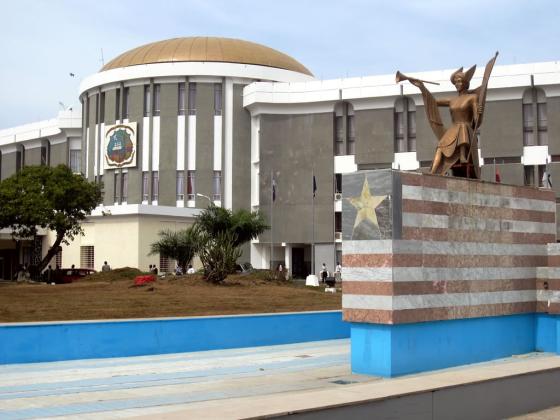Liberia: Senate ‘Undermining LACC’ with Amended Act?

Capitol Building
— Say critics including four Senators, have argued that it represents a broader attack on the fight against corruption, in a country that is already corrupt — and would undermine the gains made by the current LACC leadership in exposing corruption in the executive branch.
The Senate and House of Representatives joint amendment of the Liberia Anti-Corruption Commission Act has been slammed as an effort that undermines the country’s fight against corruption.
The amendment, which the Senate supported with 20 votes in favor, claims that it empowers the anti-graft institution to fight against corruption but, for the first time, gives it the power to prosecute corruption both in the private and public sectors. It also scraps the LACC of its current authority to seize public officials’ assets or freeze them even if indicted, except if the commission proves the person is of flight risk.
But critics of the act, which includes four Senators, have argued that it represents a broader attack on the fight against corruption in a country that is already corrupt; and would undermine the gains made by the current LACC leadership in exposing corruption in the executive.
Reacting to his colleagues’ decision, Montserrado County Senator Abraham Darius Dillon decried the majority vote as one that is not entirely in support of the fight against “endemic corruption”.
The Senator noted that the bill only intends to undermine the LACC’s fight against corruption, despite granting the Commission prosecutorial power, as it contains a clause that renders all the Commissioners currently serving subject to presidential dismissal and automatic replacement by the President.
Dillion’s position comes as Part XVI of the LACC amendment act, Transitional Provision, states that all “commissioners now serving the LACC shall remain in office after the enactment of this new law until their successors are appointed, but each is eligible to apply and be subjected to the appointment procedure provided for this law.”
Backing Dillion, River Gee County Senator Jonathan Boye Charles Sogbie asserted that when the act comes into effect; it, will not only lead to the termination of all the Commissioners’ tenured positions, but a “breach of contract which may likely lead to legal action against the government” ,which is bad for the country’s fight against corruption.
Lofa County Senator Steven Zargo lamented that the passage of the act is not in the interest of fighting corruption, but only targeting the current leadership of the Commission for their stance against corruption which, he asserted, President George Weah and his officials feel very uncomfortable with.
And for Senator Nyonblee Karnga-Lawrence of Grand Bassa County, the Senate erred in recreating the LACC when their own rules forbid two Senate laws to be merged and passed into one.
“The current law is not only amending and restating the Act creating the LACC, but it is also recreating the LACC,” Sen. Karnga-Lawrence argued.
The four senators openly opposed the passage of the act and argued that the passage was unnecessary.
The amended act, according to the Legislature, empowered the LACC to investigate and prosecute acts of corruption as well as strengthened the Commission to prevent and combat corruption in Liberia. It also empowers the LACC with powers to investigate acts of corruption both in the public and private sectors of Liberia and to prosecute those determined to be culpable of committing acts of corruption.
Under the amendment, the number of members of Commissioners has been increased from five to seven and additional departments have been created in the Commission. The departments are Administration and Supervision, Monitoring and Investigation, Prosecution, as well as Education and Prevention — with a commissioner or two assigned to head each of these departments.
The process of appointment of the Commissioners, according to the Act, starts from nomination by an Ad Hoc Committee composed of representatives of the General Auditing Commission, the Governance Commission, the Liberian National Bar Association, the Press Union of Liberia, Liberia Business Association, Anti-Corruption Advocacy Civil Society Organizations, the Liberian Institute of Certified Public Accountants, and the donor community.
The Act further stated that at least fourteen candidates shall be presented by the Ad Hoc Committee from which list the President of Liberia shall nominate seven for presentation to the Liberian Senate for confirmation proceedings.
“The Commission shall be appointed for terms of office, but the terms shall be staggered to ensure that the terms of office of all Commissioners don’t end at the same time. The LACC shall have all powers and authority in its operations and also provides for financial autonomy; it prohibits interference in the affairs and operations of the Commission by any person.”
Additionally, under the transitional provision of the Act, Commissioners now serving the LACC shall remain in office after the enactment of this new law until their successors are appointed, “but each is eligible to apply and be subjected to the appointment procedure provided for by this law.”
The LACC was created by an Act of Legislature in 2008 with the mandate to investigate acts of corruption and report findings to the Ministry of Justice for Prosecution. In a separate development, the Senate has ratified an Agreement between the Government of Liberia and the OPEC Fund for International Development (OFID) for the encouragement and Protection of Investment in Liberia.
Liberia, as a member of the OPEC Fund for International Development and other member countries, has established OFID to provide financial support to member countries in addition to the existing bilateral and multilateral channels through which OPEC member states extend financial assistance to other developing countries.
